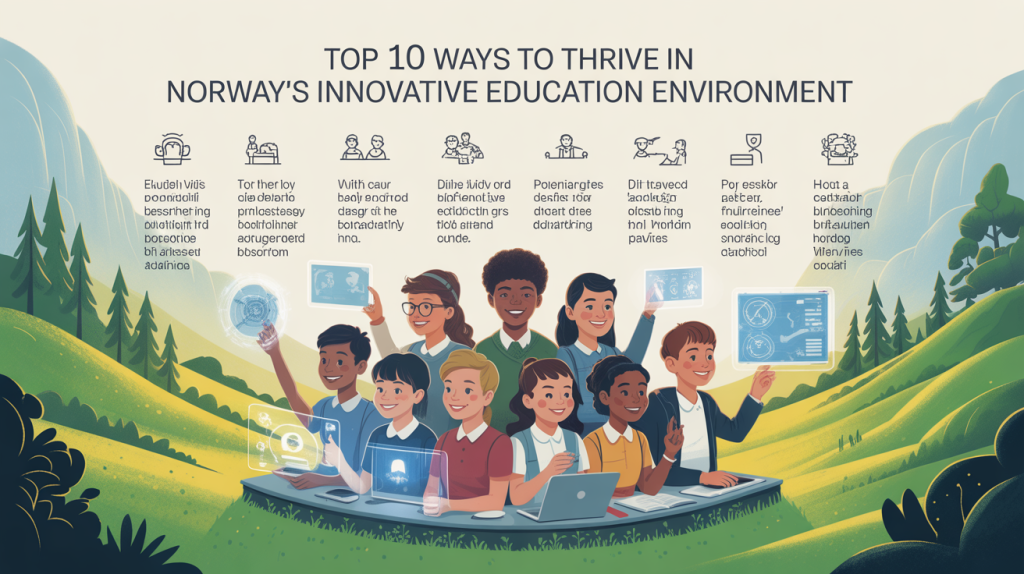Top 10 Ways to Thrive in Norway’s Innovative Education Environment
- 1. Embrace Multilingual and Globally Inclusive Learning
- 2. Engage Actively in Interdisciplinary Study
- 3. Utilize Norway’s Focus on Innovation and Technology
- 4. Seek Entrepreneurship and Start-Up Opportunities
- 5. Collaborate Across Academia, Industry, and Start-Ups
- 6. Enjoy Norway’s Natural Environment for Inspiration
- 7. Adopt Sustainable Living Practices
- 8. Develop Cross-Cultural Communication Skills
- 9. Participate in Student Organizations and Extracurriculars
- 10. Take Advantage of Support Services for International Students
1. Embrace Multilingual and Globally Inclusive Learning
Norway’s education system offers a wide range of English-taught programs, fostering an international academic environment where students collaborate across cultures and languages. This multilingual approach benefits international students by lowering language barriers while connecting them to a network of peers worldwide.
Key benefits include:
- Access to a broad portfolio of programs across disciplines
- Exposure to diverse perspectives enhancing critical thinking and intercultural skills
- Opportunities for networking and lifelong global connections
2. Engage Actively in Interdisciplinary Study
Norway encourages students to participate in various interdisciplinary programs that bridge humanities, natural sciences, technology, and arts. This approach helps students develop versatile skills that are highly valued in the global labor market.
Considerations for institutions and students:
- Promote flexible curricula that support cross-faculty collaboration
- Emphasize problem-solving and creative thinking through diverse course combinations
- Facilitate research and project opportunities that span multiple disciplines
3. Utilize Norway’s Focus on Innovation and Technology
Cities like Oslo and Trondheim are innovation hubs where academic institutions integrate cutting-edge research and technology into their teaching and learning environments. Students benefit from access to advanced labs, incubators, and collaboration spaces.
Why this matters:
- Enhances practical learning experiences and skill acquisition
- Connects students with industry trends and emerging technologies
- Increases employability through exposure to future-focused sectors
4. Seek Entrepreneurship and Start-Up Opportunities
Norway supports entrepreneurship through a strong infrastructure including startup incubators, funding access, and business development programs. Students keen on launching ventures are encouraged to leverage these resources alongside their academic studies.
Benefits for entrepreneurial students:
- Hands-on experience turning ideas into viable businesses
- Access to mentorship and networking within the Norwegian startup ecosystem
- Opportunities for funding and scaling innovative solutions
5. Collaborate Across Academia, Industry, and Start-Ups
Norwegian universities actively facilitate collaboration between academia, industry leaders, and start-ups, creating opportunities for students to gain real-world experience and build professional networks.
Collaboration brings:
- Practical insights complementing academic knowledge
- Exposure to work environments and business challenges
- Enhanced CV and job readiness through internships and projects
6. Enjoy Norway’s Natural Environment for Inspiration
Norway’s breathtaking natural landscapes offer students a unique means to balance rigorous academic schedules with outdoor recreation, promoting wellbeing and creativity.
Highlights include:
- Hiking, skiing, and other outdoor activities conducive to physical and mental health
- Opportunities for experiential learning connected to Norway’s environment-based research
- A supportive lifestyle fostering productivity and innovation
7. Adopt Sustainable Living Practices
Norway’s global leadership in sustainability and renewable energy is embedded in its education system. Students are encouraged to adopt eco-friendly habits and participate in projects that promote environmental responsibility.
Institutional and student focus areas:
- Integration of sustainability in curricula across disciplines
- Participation in university-led sustainability initiatives
- Acquisition of knowledge relevant to green technologies and policies
8. Develop Cross-Cultural Communication Skills
Inclusion is a cornerstone of Norway’s education philosophy. Students from diverse cultural backgrounds learn to navigate complex global environments through daily interaction and shared academic experiences.
Advantages of cross-cultural skill development:
- Enhanced teamwork and leadership abilities
- Greater adaptability in multicultural workplaces
- Increased sensitivity and collaboration effectiveness
9. Participate in Student Organizations and Extracurriculars
Beyond academics, Norway offers a vibrant array of student clubs, societies, and initiatives that foster personal growth, peer connections, and leadership.
Extracurricular activities provide:
- Platforms to develop soft skills such as teamwork, problem-solving, and event management
- Opportunities to engage with Norwegian culture and community
- Creation of lifelong friendships and professional networks
10. Take Advantage of Support Services for International Students
Recognizing the challenges international students face, Norwegian universities provide dedicated support services covering academic advising, language assistance, mental health, and career counseling.
Key points for international success:
- Access to tailored orientation and integration programs
- Continuous academic and personal support
- Clear pathways to internships, job placement, and residency guidance
How Study in Norway Supports Thriving in Norway’s Education Environment
At Study in Norway, we are committed to empowering international students and education professionals. Our services bridge the gap between student aspirations and Norway’s educational opportunities by:
- Offering a centralized platform showcasing comprehensive program information and application support
- Providing market insights and collaboration opportunities for universities and agencies
Take the Next Step with Study in Norway
Ready to elevate your Norway education recruitment strategy? Contact Study in Norway today to learn how we can support your goals and help your students thrive in one of the world’s most innovative academic environments.

